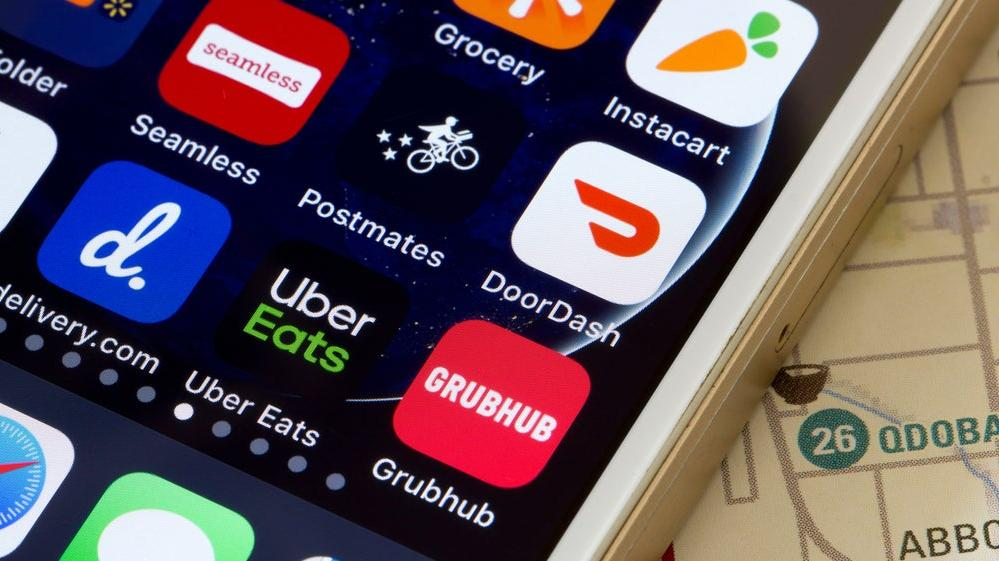What The Hell Is Happening With Food Delivery Apps In New York?
DoorDash, Uber, and Grubhub are suing over a new minimum wage law set to take effect in NYC.
A new rule regarding the minimum wage for app food delivery workers in New York City has led to DoorDash, Grubhub, and Uber all filing lawsuits against the city. You know, just in case you thought ordering dinner was a simple, straightforward transaction.
The new NYC law, which passed in June and was initially scheduled to take effect July 12 (more on that later), requires that workers for third-party delivery apps be paid a minimum of $17.96 per hour (before tips), a significant increase from the current average of $7.09. This minimum hourly rate would also increase to $19.96 in April 2025, per the new law. App companies such as DoorDash and Uber can either pay delivery workers this minimum hourly wage or pay workers 50 cents for every minute of their trip.
"Our delivery workers have consistently delivered for us — now, we are delivering for them," said New York City Mayor Eric Adams in a statement announcing the new minimum wage. In response to the passage of the new law, DoorDash and Grubhub filed a joint lawsuit in the New York Supreme Court and Uber filed its own lawsuit separately in the same court.
Why food delivery apps are suing New York City
The food delivery app companies are arguing in their respective filings that the new rule will actually harm delivery workers more than it will help them.
Specifically, the DoorDash and Grubhub filing calls out the New York City Department of Consumer and Worker Protection for allegedly excluding grocery delivery workers when calculating this new minimum wage. The lawsuit also alleges that the law would force food app delivery companies to pay workers for on-call time, meaning time when they're logged into the app but not actually making deliveries.
DoorDash and Grubhub argue in the filing that the rule "undermines" both companies' "ability to offer flexible arrangements" to delivery workers. Therefore it will lead the app companies to have to "force workers to schedule delivery blocks; restrict workers from rejecting offers; automatically disconnect workers' access during inactive periods or travel outside of busy areas; or eliminate platform access altogether for workers who reject too many offers," in order for the companies to avoid prohibitive added operational costs.
Other potential implications of this law, according to the lawsuits, are that the app companies might have to raise fees on these delivery services to offset the costs and possibly limit the number of workers on each platform so that multiple apps wouldn't be paying one worker for the same hours.
Interestingly, DoorDash also recently announced that it would be giving its Dashers the option to be paid hourly. DoorDash drivers can now choose to Earn by Time (as DoorDash calls it) or Earn Per Offer, which is the existing pay model the app has always used. The Earn by Time pay structure allows Dashers to "earn a guaranteed hourly minimum rate plus 100% of tips on top." When available, DoorDash drivers can choose between the two pay modes and can switch between the two.
Anyone who has been tracking the rise of third-party food delivery services over the past decade might be hesitant to believe that these companies are doing anything in workers' best interests. As far back as 2019, we saw how the apps were paying workers less due to changes in the technology's pricing algorithm, and past lawsuits have alleged that the tipping structure on the apps misleads customers, making them think they're providing extra pay for exceptional service when the money often just subsidizes the existing wages paid by these food delivery companies.
DoorDash clarified to CNN Business that although it considers the new NYC rule "bad policy," the company is not opposed to minimum wage for delivery workers. However, the lawsuits filed by DoorDash, Grubhub, and Uber have apparently accomplished some small part of what they hoped to: A judge in NYC has temporarily blocked the new law from taking effect on its initially scheduled date of July 12. The law, the judge said, cannot go into effect until there's a hearing for the lawsuit.
Oral arguments will begin on July 31, and however this plays out will surely be a blueprint for other major cities as they address the issue of third-party food delivery and the workers who make it happen.
